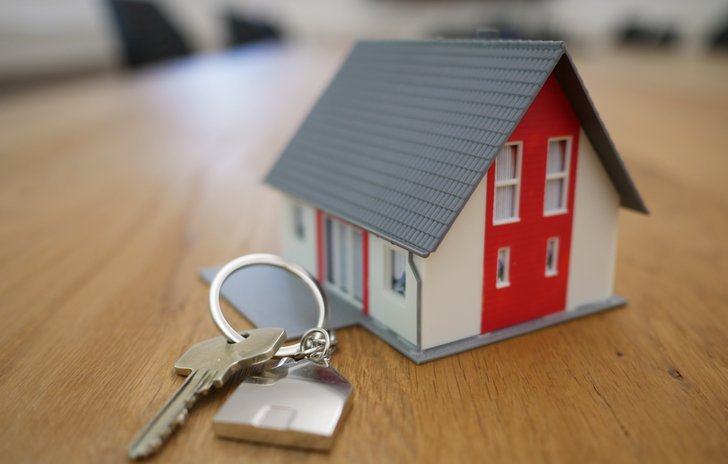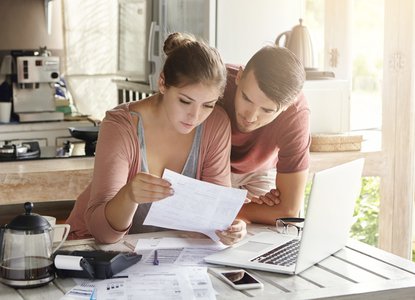There are lots of things to consider when finding a home to either rent or buy. If you're looking to put a roof over your head for the first time or you're ready to get on the property ladder, there are plenty of financial costs involved and it can feel very overwhelming.
You might be surprised by all the processes, forms, contracts and considerations on your finances. We're here to help you by unpacking some of the common jargon and terminology that you might come across when you make your first steps to rent a home or buy your first house or flat.
Read on for a useful glossary of terms that will help you understand renting and buying a home, then watch the videos on this page and have a go at our quiz.
Advice for young people on finding and renting a home
Where do you start when you are looking for a home to buy or rent? What's the real difference between renting a property from a landlord or owning it yourself?
Get familiar with some of the terminology and words you'll come across in the process of renting your new flat or house, whether you are planning on renting a property to live in on your own, or would like to rent a room in a shared place.
Glossary of terms associated with renting a home
What is renting?
Renting a property is an agreement between the tenants (that's you!) and the landlord where a payment is made (usually monthly) for the temporary use of that property. There are certain rights and responsibilities that both the tenant(s) and the landlord have to agree to and you can find more information about these expectations and legal responsibilities on the government website.
What does tenant mean?
A tenant is the person who wants to live in a house or flat, so, you! A tenant will be expected to pay rent in order to live in a property as well as be respectful of the property. However, it is the responsibility of the landlord who owns the property to maintain the structure of the building and, for example, fix the boiler if it breaks.
A tenancy agreement is the contract between you (the tenant) and the landlord (the person who owns the property) which says that you are allowed to rent the property as long as you agree to certain conditions and rules. This agreement will state the rules you need to follow, for example how often and how much rent you will pay to the landlord, perhaps whether or not pets are not allowed to be kept in the property or maybe any restrictions on any decorating or changes to the property. It is your responsibility to check the tenancy agreement before you move in and is there to protect both you and the landlord.
Find out more about tenancy agreements on the government website.
Who is the landlord?
The landlord is the person who owns the property you are renting. You will pay the landlord your rent and agree to their terms when you first rent the property. Sometimes you will deal with a letting agency and may never meet the actual property owner.
What is a guarantor?
A guarantor is someone who agrees to pay the rent on your property in the unlikely situation that you can't manage the payments. It is very common for a landlord to request you have a guarantor sign an agreement before they rent their property to you. The guarantor will then act as the safety net for the landlord if you can no longer pay your rent for any reason. Typically, a guarantor is a family member who knows you well and can confidently say you are a reliable person, but it doesn't have to be the case.
Why do I need a deposit to rent a house?
When you rent a property, your landlord will request a deposit which is a sum of money paid by you, the tenant, to the landlord in addition to your first month's rent. The deposit is a security for the owner of the property and will be given back to you when you complete your contract and move out. However, if there is any damage to the property or you miss your rent payments, your landlord may hold onto your deposit and not pay it back.
You can find more information about deposits for renting a property on the Tenancy Deposit Scheme website.
What is council tax?
Council tax is a tax that you pay to your local authority to cover the cost of services such as schools, libraries, and rubbish collection.
Some people are exempt from paying council tax which means they don't have to pay at all, while other people may be eligible for reductions. For example, full-time students and anyone under 18 years old are exempt from paying council tax whilst a person living on their own is eligible for reductions so will be able to claim 25% off their council tax bill.
You need to pay your council tax whether you are renting your home or you own it. If you live with other people in your shared home, everyone is responsible for paying the council tax. However, there will only be one payment per property which means that you can split the cost of the council tax payment between you all.
How much council tax should I pay?
The amount you pay in council tax is dependent on:
- The value of the home you live in
- how much your local council charges for that band
- whether you can get a discount or exemption from the full bill.
Find out more about paying your council tax on the government website.
What is housing benefit?
Housing benefit can help you pay your rent if you’re unemployed, on a low income or claiming benefits. You cannot claim both housing benefit and Universal Credit. However, if you are not eligible for Universal Credit, you may still be eligible for housing benefit.
Check if you are eligible on the government website.
Find out more on our Understanding your benefits topic page.
What is eviction?
The term eviction means you are removed from your home. If your landlord evicts you without following the appropriate procedure they are breaking the law and you can appeal directly to the council or courts for help.
- Find further advice if you are at risk of losing your home.
- Find urgent advice from Shelter.
- A lawful eviction may follow a ‘Section 21’ notice.Find out more.
Resettlement after prison or youth detention
If you are in custody and upon your release will be homeless, you can get resettlement support. A resettlement worker will help refer you to suitable accommodation.
How do I go about buying a house?
Buying a house can be a complicated and overwhelming process. There are lots of considerations to think about like where to live, how much money to borrow and whether you will be able to cover the regular mortgage repayments as well as the upfront additional costs which come with buying a new home. For example, new home owners will need to budget for payments to solicitors, covering stamp duty and stumping up a deposit which all add to the financial pressure of buying a new home. Initiatives like the government's First Home Scheme might help first-time homeowners to get on the property ladder if you live England and are looking to buy a new-build home.
There are benefits to buying a property as often the monthly mortgage repayments are less than paying monthly rent and at the end of the day, you own the home which means you can make changes to it, decorate it how you like and keep pets if you wish.
Glossary of useful terms to understand when you are buying a house or flat
Read on for a list of helpful terms and definitions which you might come across when you are buying a new home.
What is a mortgage?
A mortgage is like a king-sized loan you use to pay for a new house. Mortgages are repaid over a long period of time, often upwards of 25 years, and unlike rent, these monthly payments start to pay off the loan so that eventually, you may own the property. The mortgage is agreed with the lender and the amount you pay is based on the value of your house or flat. If you don’t keep up with repayments, the mortgage provider is legally allowed to repossess your house. Each month, your mortgage repayment will also include an extra charge which is called interest.
Find out more about borrowing money responsibly here.
Read more about the support available for mortgage interest.
What is stamp duty land tax?
Stamp Duty Land Tax is a tax you pay if you buy a property over a certain price. The amount varies according to the price of the property and how many properties you own.
Find out more about stamp duty, how it works and how much you might need to pay.
Why do I need home insurance?
A home insurance policy can protect your home and belongings in the event that they are damaged or stolen. You will pay home insurance so that if there is an accident, flood, storm, robbery or other incident that means your home and belongings are seriously affected, the insurance company will contribute to the cost of fixing the issues or replacing the items. Although home insurance is not a legal requirement, sometimes it may be required, for example if you’re taking out a mortgage. You would pay your home insurance as a set amount, either in one lump sum each year or monthly and it will come with set terms and conditions. If you need to make a claim, you may have to cover the excess which is a set amount of money you will have to pay as a contributions towards the claim.
If you are renting, you only need to cover your belongings, as the landlord should cover the building itself in their own home insurance policy.
You can find out more definitions and terms relating to home insurance on the RAC website here.
What is a service charge?
The service charge is a financial contribution you may have to pay towards the upkeep of the outside areas of your property. A service charge is typically something you would pay if you live in an apartment block, flats or in a shared setting which has a communal garden, stairway, shared roof or other facilities you share with people outside your household. For example, Nathan lives in an apartment with a communal garden. Alongside fellow residents, he pays a service charge to cover the cost of maintaining the garden.



